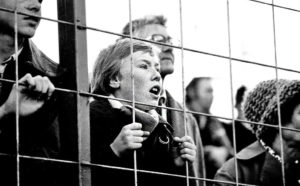By now, snooker should have died out. The game seems squarely at odds with a modern world ruled by speed — where facts are onscreen at our fingertips, and the patience required for slow-moving stories is increasingly on the wane. It is not just the fusty bow ties and waistcoats that give the game of snooker a quaint, old-fashioned feel. With its languorous blend of slow strategy and quiet absorption, it should really be a thing of the past.
Except that hasn’t happened — not, one might say, by a long shot. The game continues to grow. It has been estimated that around 500 million people follow snooker right across the globe. In China, it remains a boom sport, with fanbases rapidly expanding across Europe and the Middle East, especially among young people. In other words — in the midst of our ever more rushed, hyper-accelerated world — snooker is thriving.
How to explain this? Counterintuitively, I’d say it’s that glacial pace. Six-time world champion Steve Davis has defended the game’s “slow burner” spirit. According to Davis, any effort to make snooker fast actually pushes against what makes the game compelling. While initiatives like the Snooker Shoot-Out have their place, it is the long, multi-session matches that remain the sport’s pinnacle. “It’s a bit of a red herring,” Davis has said, “to think that you have to make snooker faster to be more entertaining. Snooker doesn’t work that way, actually it works the opposite way to a lot of sports — it doesn’t have to be fast to be entertaining… sometimes the tactics alone can create the enjoyment and the fascination”.
A quiet game, with a wild history — a working-class pursuit, with an aristocratic look — snooker is, in every sense, a game of contradictions. Its ancestor, billiards, was very much the preserve of the English and French nobility. King Louis XI owned the very first indoor billiard table; Mary Queen of Scots was an avid player, and even had a table in her prison cell. But as snooker out-muscled billiards in the early 20th century, it found new homes in the working men’s clubs of Britain’s industrial towns. And as the years went on, the nation’s billiard halls developed a particular kind of reputation — a less than salubrious one, for suspect characters and shady dealings.
Perhaps it was the location of the halls, often stuck in the rough part of town. Perhaps it was the fact they were so dark — places of shadow and secret things. Perhaps it was something about the game itself, something to do with how quiet it can be, quiet enough for mid-game talks around the tables. Whatever the truth, by the middle of the century, snooker halls had become a little bit dangerous. The Kray Twins bought the Regal Billiard Club in Mile End in 1954, and made it a base for their protection racket. It became one of Ronnie’s favourite places. “There were often evenings at the billiard hall,” wrote their biographer John Pearson, “when he’d just sit, brooding and menacing, sunk in silence”. But it was also a scene of violence. In a famous story, a rival Maltese gang turned up at the Regal and made the mistake of demanding some money. The Krays were unimpressed. Ronnie charged at them with a cutlass, and chased them out to the street.
Snooker’s shadowy side has always coexisted with a decorous formality that remains unique in world sport. To this day — for most tournaments — players still don the black tie of the traditional English gentleman. Fashion-wise, watching a snooker match can feel like watching a face-off between a pair of Victorian aristocrats. And the audience, too, sits largely in silence — huddled intently, like the audience at a Shakespeare play. Anyone who does call out will be quickly silenced by the referee, or even removed from the arena for improper conduct: such things as noise are for other sports, not for the baize.
Part of the game’s fascination lies in this peculiar blend of wildness and restraint. It has always been a game with a dark edge — a haven of booze and drugs as much as quiet strategy, a volatile meeting-place of order and disorder. And snooker players, from the start, live a precarious life. From a very early age, the choice between completing secondary school and playing snooker is an either/or decision: there is not room for both. A poorly appreciated point arises — partly about class, partly about channels of educational opportunity. In stark contrast to games like cricket and rugby, the infrastructure is just not in place for snooker players to combine their education with the prospect of an elite level future. In order to be good enough — in order to succeed — you have to do nothing but play snooker.
And turning professional does not guarantee a good income. In the game’s lower reaches, players scrabble to earn a living. “It is either top 10 or top 20, or else don’t bother,” former World Champion Neil Robertson has said. “If you are a single guy, you can scrape by. But if you have got a family, snooker is not really a viable career choice.” The introduction of £20,000 guaranteed annual earnings, two years ago, for all players on the main tour was an effort to ease such financial pressures, at least by a little. Snooker, in short, is a tough road; brutal, poorly lit, and hard to follow. The need for young cueists to sacrifice their lives to it shows fissures in society — dramatic inequalities between the social profile of different sports, and the support structures they offer.
Snooker’s money struggles have led the game to a crossroads. In recent years, Saudi Arabia has risen as a leading tournament venue — bringing with it vast reserves of prize money. The inaugural Saudi Masters this summer — billed by the board as the game’s “4th major” — had a prize pot of £500,000 for the winner, the same sum as the World Championship itself. It looks more and more likely that the future of snooker will involve a big shift towards Saudi, and its seductive pots of cash. But it will come at a price which, for many, is too high.
As the site of the World Championship for nigh on 50 years, the Crucible Theatre in Sheffield has been the spiritual home of snooker for so long now that any move away from the city has always seemed unthinkable. “In my lifetime, however long that may be, there will be no changes,” said Barry Hearn, snooker’s longstanding supremo, in 2022. “And after me, my son Edward will be here, with a little note in his dad’s will which says ‘Crucible. We’re staying’”. But earlier this year, Hearn abruptly changed his tune. “The Crucible is past its sell-by date,” he announced in May. “What we’re saying is, for the sport to be bigger, we’re going to be judged by prize money … In all sport it does come down to money, whether we like it or not.” After almost half a century, the mood music has dramatically shifted. Hearn is jangling the keys of the kingdom — and the Crucible’s time is running short.
Hearn’s all-about-the-money philosophy has angered many fans, who remain passionately attached to the poetry of snooker’s past. Some prominent players have also gone public with their concerns. “The Crucible is very special,” claimed former World Champion Ken Doherty. “It should be sacred, and you can’t buy sacred things.” Yes, the Crucible might be fantastically small — with a capacity of less than a thousand — but the intimacy provides a claustrophobic intensity that is unrivalled. What’s more, the Crucible is something more than just a venue; it is a cauldron of history, drama, and memory, the site of snooker’s most famous moments and its foremost iconography. This is where, in 1982, a triumphant Alex Higgins cried into his baby’s arms. It is where, in 1985, Dennis Taylor held his cue aloft after beating Steve Davis on the final black. It is where, in 1997, Ronnie O’Sullivan composed the game’s most perfect frame, in the form of the fastest maximum break that the world will ever see.
The Crucible, in other words, is a fatherland, a spirit — located not just in Sheffield, but in the heart of every snooker fan. In considering its future, something far more important than money is at stake. “It is not just fans who are doe-eyed traditionalists,” journalist Phil Haigh has written. “Some players still see the value in sport outside of cold hard cash.”
A shift to an overseas locale would also be a sea change of a different kind. The national identity of snooker has always been complicated. On the one hand, its worldwide appeal continues to grow; on the other, its infrastructure remains very much based in Britain. An unshakeable feeling lingers that the game is tangled with the texture of Britishness, a deep-set bond that it would be dangerous to break. The qualities it brings — of slow-paced, cosy, televisual comfort — correspond with a jewel cabinet of much-cherished British rituals, the sacred consolations of tea and toast, living room, snug TV, raining outside, putting-the-kettle-on everydayness.
A brave new world for international snooker — with a World Championship in Saudi Arabia, or China, or a range of locations each year — could well be a good thing. After all, the idea of a football World Cup staged in England every single time would be both outrageous and daft. The use of the Crucible every year is, quite obviously, unfair on international players, who now make up nearly half of the tour.
Maybe, though, that is not quite the whole story. Maybe, in a small theatre in Sheffield city centre, the soul of snooker really does live and breathe — a soul that, torn away from the ghosts of its past, might not be able to survive. If so, it is a soul that — for the sake of cash — we toy with at our peril.
Disclaimer
Some of the posts we share are controversial and we do not necessarily agree with them in the whole extend. Sometimes we agree with the content or part of it but we do not agree with the narration or language. Nevertheless we find them somehow interesting, valuable and/or informative or we share them, because we strongly believe in freedom of speech, free press and journalism. We strongly encourage you to have a critical approach to all the content, do your own research and analysis to build your own opinion.
We would be glad to have your feedback.
Source: UnHerd Read the original article here: https://unherd.com/



